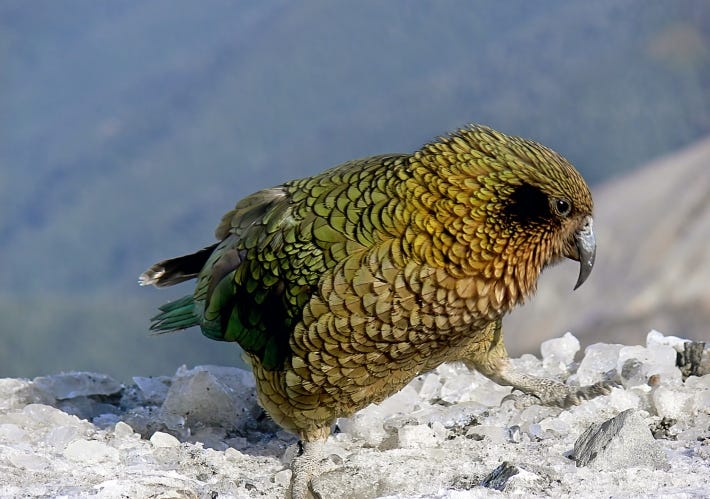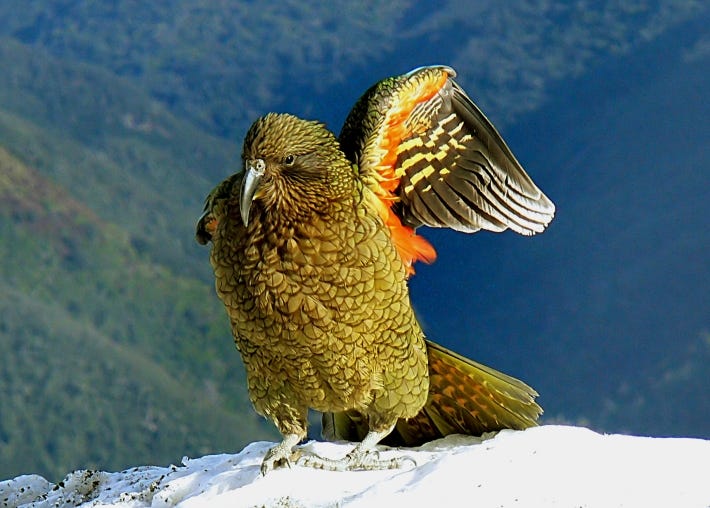Bird of the Week: Kea
It lives in the mountains, is super-smart, and hates cops. And that's just the start.
This week's Bird of the Week can be described using many different superlatives. The world's only alpine parrot? Yes. One of the most intelligent birds in the entire world? Yes. A fighter for disability rights and a fierce opponent of the supremacy of the automobile and the police? Yes! Can one bird really be all of this and more? You better believe it. Meet the kea.
Oh yeah, and the kea is a cutie too. Look at those yellow-green feathers, all fluffy and adorable. You're looking at the kea in its natural habitat, the mountainous regions of New Zealand, which is the only place in the world where you will find it the wild, and, as I mentioned, the only place in the world where you will find a parrot that lives in the mountains instead of the jungles. (Scientists are now speculating that the kea once lived in other parts of New Zealand, but now it just likes the mountains, thanks very much.)
The kea is quite lovely on the outside, but wait, there's more! Look what happens when it opens its wings up.
That's right, it's hiding some brilliant orange-and-yellow wingwork under there. The bird has layers, people.
The look alone would vault the kea into the ranks of top-flight fowl, but the kea is also a wildly brilliant bird. How brilliant? One study showed the kea performing higher on intelligence tests than some primates. Another study showed the kea displaying incredible human-like behavior. From Radio New Zealand:
In a paper published today in Nature Communications, University of Auckland experts found the birds can judge statistical odds in a way only ever seen before in infants and great apes.
In a range of tests at the Willowbank Wildlife Reserve in Christchurch, kea worked out that choosing a particular coloured token always led to a food reward, and even managed to learn which of their rangers was most likely to pick the token they wanted.
Study co-author Alex Taylor, a psychologist who studies intelligence in animals and birds, said the behaviour they saw was unprecedented in birds.
"The kea and chimpanzees and humans are all showing this ability to reason.
"I think the reason that they're showing this curiosity, this playfulness, is because there's this really interesting intelligence going on in their minds which is a lot smarter than we thought it was."
Oh my god! The kea has also been taught to use touchscreens. This bird is probably smarter than some of our biggest human idiots is what I'm saying.
The kea even knows how to cope with disability. The New York Times recently profiled Bruce, a kea who tragically lost his upper beak. As you can see from the pictures, the kea's beak is very big and glorious, and very important to its quality of life. Bruce could have met a horrible end, but Bruce is a kea, so instead, he figured something amazing out. From the Times:
He has taught himself to pick up pebbles of just the right size, hold them between his tongue and his lower beak, and comb through his plumage with the tip of the stone. Other animals use tools, but Bruce’s invention of his own prosthetic is unique.
Researchers published their findings Friday in the journal Scientific Reports. Studies of animal behavior are tricky — the researchers have to make careful, objective observations and always be wary of bias caused by anthropomorphizing, or erroneously attributing human characteristics to animals.
“The main criticism we received before publication was, ‘Well, this activity with the pebbles may have been just accidental — you saw him when coincidentally he had a pebble in his mouth,’” said Amalia P.M. Bastos, an animal cognition researcher at the University of Auckland and the study’s lead author. “But no. This was repeated many times. He drops the pebble, he goes and picks it up. He wants that pebble. If he’s not preening, he doesn’t pick up a pebble for anything else.”
Keas are pioneers for disabled birds! Just remarkable.
I am not even done yet. The kea is supremely unafraid of humans, and is constantly causing them trouble—stealing things, damaging property, and generally wreaking havoc. (In 2009, for instance, a kea swiped a Scottish guy's passport and flew off with it. The bird wanted to go places!) Here is an A+ video of a kea wandering into some peoples' yard, getting all up in their space, checking out their shoes, flying around, chasing another bird, casually breaking things, and doing a call-and-response with a little kid. (The sound of the call, by the way, is where the kea gets its name—and you can tell that it's appropriate because the kid says "kea!" and the bird knows it's being called, and responds in kind.)
But there is nothing more the kea likes to do than try and dismantle a car. YouTube is filled with videos of them tearing at cars, often in packs.
My favorite of these videos is called "Kea destroying police car." The title is overhyped, but the kea gives it a go. My conclusion from all of this is that it is opposed to the grip that polluting automobiles have on our planet, and also wants to defund the police. Kea for president???
Unfortunately, while this behavior makes the kea iconic, it has also caused it great danger. I'll let the Guardian explain:
Over the years, they’ve made headlines for rummaging through tourist bags, stealing wallets and in one case, making off with an unlucky Scottish tourist’s passport. But among farmers, they acquired notoriety for attacking and occasionally killing sheep. The attacks so incensed early New Zealand sheep farmers that the government put up a ‘bounty’ on kea beaks – a policy that continued for about 100 years, until 1970. Analysis of government bounty payments found that an estimated 100,000 kea were killed for bounty. According to New Zealand’s Department of Conservation, kea today are nationally endangered, with only around 3000-7000 birds remaining in the country.
That's right, this is a struggling bird. It's protected under New Zealeand law, but still—the world needs this super-smart, super-cool bird to survive. We can't afford to lose the kea!
A reminder: you can check out our complete Bird of the Week list here, and get in touch with your bird suggestions at hello@discourseblog.com.




